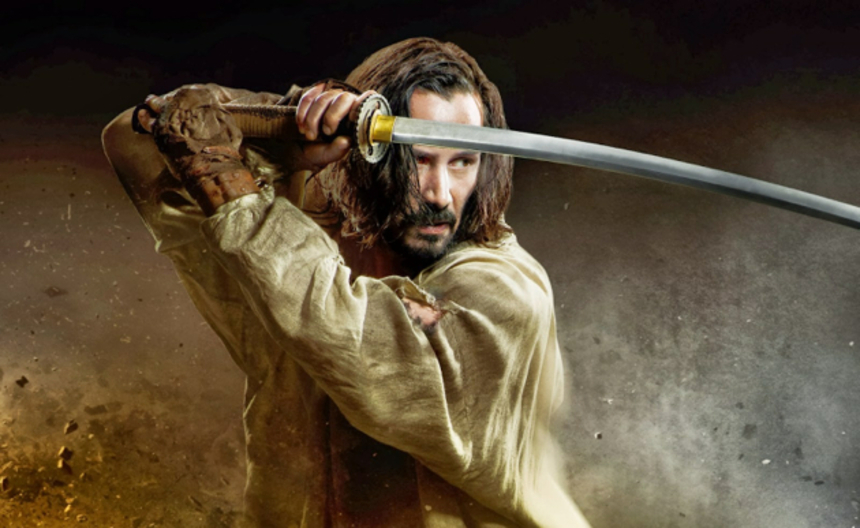Review: 47 RONIN Is A Classic Display Of Hollywood Ignorance

Keanu Reeves can do little more than observe from the sidelines as first-time director Carl Rinsch desecrates one of Japan's most revered historical epics with an inexplicable parade of sorcery and monsters..and other, you know...Asian stuff.
The revenge of the 47 ronin is a real event that took place at the beginning of the 18th Century in Tokugawa-era Japan. While the details of the story have been adapted and retold through many different art forms innumerable times in the three centuries since, the central tale remains a stirring and beloved story of loyalty and honour.
In the widely accepted version of events, the evil Lord Kira provokes the stoic Lord Asano repeatedly into attacking him, disgracing himself and his house in the process. Asano is ordered to commit seppuku, and his land is handed over to Kira. Now rendered masterless "ronin", Asano's samurai guards are disgraced and banished, but 47 of his most loyal men vow to avenge their master - an act they know will bring about their own deaths.
In Universal's new version of 47 Ronin, written by Chris Morgan (Wanted, Fast 5) and Hossein Amini (Drive, Snow White and the Huntsman), the villainous Lord Kira (Asano Tadanobu) uses witchcraft in order to bring about Asano's death and immediately takes control of his land and moves in on Asano's beautiful daughter, Mika (Shibasaki Ko). Mika, however, only has eyes for Kai (Keanu Reeves) - a mysterious half-breed possibly spawned by forest demons - who is excluded from society by everyone except the benevolent Asano and his family.
When Asano's men are banished, General Oishi (Sanada Hiroyuki) and a small faction of other disgraced ronin hide out in the forest and plot their revenge. If they do not act within a year, the Shogun has permitted Kira to marry Mika and formally take control of their kingdom. Having lost their swords, the 46 ronin are rendered powerless, until Kai offers his help.
47 Ronin reportedly cost somewhere in the region of $170 million to produce, and much of that ridiculous budget is up there on the screen. Shot mostly on location in Hungary, the film features some impressive sets, garishly colourful costumes and an abundance of perfectly satisfactory CGI work. Production design is not a problem for first-timer Rinsch, where 47 Ronin fails spectacularly is in its handling of the material.
Watching the film, there is no clear evidence that anybody involved, not least the film's scriptwriters, ever set foot in Japan. In fact it feels like their research consisted solely of hazy recollections of seeing Kurosawa's Ran once in college, before skimming through a couple of Miyazaki films. Chock full of fantastical monsters, black magic, evil witches and malevolent dragons, 47 Ronin feels more like "Clash of the Titans in kimonos" than any previously filmed version of the story.
Respected Japanese actors Sanada Hiroyuki and Asano Tadanobu often look uncomfortable and embarrassed, not for performing in a second language, but because of the ham-fisted way a revered chapter of their nation's history is being turned into a sub-par Lord of the Rings adventure.
The film's two lead actresses fair little better. Shibasaki Ko will always be remembered by western audiences as the murderously seductive Mitsuko from Fukasaku Kinji's Battle Royale. She has since gone on to build a respectable career as a leading lady back home, but here she has nothing to do but whimper and scream while the men fight over her like a trophy. Kikuchi Rinko, on the other hand, who has become Hollywood's go-to Asian actress ever since her Oscar-nominated turn in Alejandro González Iñárritu's Babel, is frankly awful as the scheming witch manipulating Lord Kira from behind the scenes. Seducing men with her black magic, or transforming into a hokey CGI fox, it's a potentially excellent role with which Kikuchi could have a great deal of fun, but she simply isn't up to the task of being threatening and sexy at the same time. My suspicions are that Shibasaki Ko would have been a much more promising choice.
Throughout everything, Keanu Reeves' Kai is either sidelined or elaborately excluded. A construct of this film, his character is repeatedly victimised and persecuted for his mixed ethnicity and rumours abound that he was in fact sired by the demons who haunt the forests where he was found as a child. Lord Asano took him in, raised him and trained him to fight, but much of the film is taken up with Kai's efforts to win the respect and trust of the other 46 ronin. Most of the time, however, Reeves looks lost, unconvincing as a warrior, victim or potential saviour.
Taken as pure preposterous fantasy, there is some B-grade fun to be had from 47 Ronin, and audiences unfamiliar or disinterested with the original story or its importance could conceivably have a good time. However, anyone with more than a passing knowledge of Japan, its history, or even just its epic back catalogue of samurai cinema will struggle to see the film as little more than a baffling fairground attraction devised by a boardroom of ignorant bean counters.

Do you feel this content is inappropriate or infringes upon your rights? Click here to report it, or see our DMCA policy.






